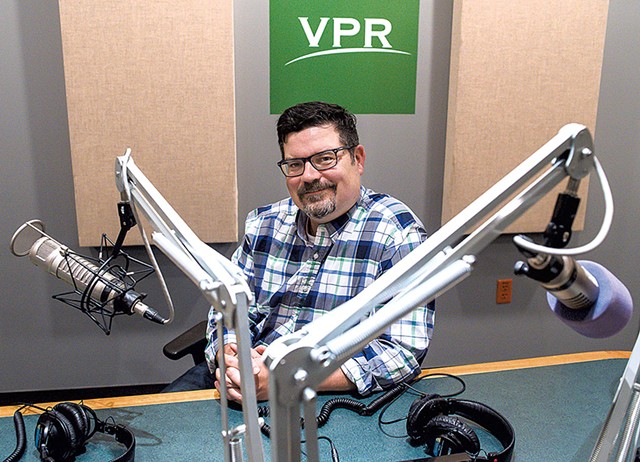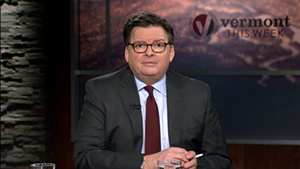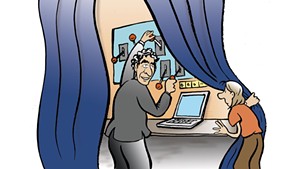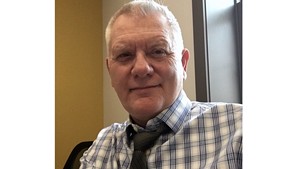
- File: Glenn Russell
- VPR president and CEO Scott Finn
Updated at 6:17 p.m.
Vermont's two statewide public broadcasters plan to merge next year, creating what would likely become the state's most financially robust media organization.
The boards of Vermont Public Radio and Vermont PBS unanimously approved the merger plan on Wednesday, they announced in a joint statement. The arrangement, which is subject to approval by the Federal Communications Commission and the Internal Revenue Service, is slated to take effect next July.
"We think that together we'll be able to serve Vermont better. We'll be able to tell more stories on more platforms and reach more people," VPR president and CEO Scott Finn, who will lead the combined entity, said in an interview. "We have the same mission and complementary skills and abilities. That's why people feel that it makes sense."
The new organization will be legally incorporated as "Vermont Public," according to Finn, though its leaders have not decided whether to publicly rebrand the radio and television stations under its umbrella. "We don't want to mess with success, and we're going to be very cautious about that," he said.
Similarly, Finn said, it's too soon to say what programming and operational changes might result from the merger, though he made clear that nothing would change until the deal is sealed next summer. "Over time, you'll see us able to do more for the community," he said. "It won't happen tomorrow, but over time I think the community will be able to notice the difference."
According to Finn, the organizations have no plans to lay off any employees as they merge their operations. VPR currently has 59 full-time and 14 part-time staff members; Vermont PBS has 42 employees.
“I don’t foresee any changes in staffing levels in the near future due to the vote today,” he said. But Finn added what he called “a COVID caveat”: “Because of COVID-19 and the effect it’s having on the economy, it’s really difficult to see into the future and make promises, and that would’ve been true regardless of what we did today,” he said.
Until recently, the two stations were located a stone’s throw from one another in Colchester’s Fort Ethan Allen complex. Vermont PBS has been in the process of relocating to Winooski. Finn said it wasn’t clear whether they might merge facilities in the future, noting that most staffers of both entities have worked remotely since the start of the coronavirus pandemic.
Along with Finn, the new organization will be led by chief operating officer Steve Ferreira, who has served as Vermont PBS' interim CEO since July. A new board of directors will be headed by public relations consultant Nicole Junas Ravlin, currently the vice chair of VPR's board. GameTheory CEO Marguerite Dibble, now the chair of the Vermont PBS board, will serve as vice chair of the new board.
The two organizations have collaborated frequently in recent years, conducting joint polling, hosting joint debates and broadcasting each other's content. According to Ravlin, board members of the respective stations have spent that time engaged in informal but increasingly serious discussions about a merger. Last September, she said in an interview, they hired the Public Media Company, a Colorado-based consultancy, to study the possibility.
“We came to the conclusion that coming together so that we could pool our resources — not only from a financial standpoint but from a talent standpoint — was the best path forward,” Ravlin said.
During a press conference on Wednesday afternoon, Ferreira said the two nonprofits have “very strong but complementary [business] models.” He added, “From a financial standpoint, as well as from a mission standpoint, it really made sense. We just fit well together.”
Though both rely on similar pools of donors, underwriters and foundations for revenue, according to Finn, the organizations expect to raise more money together. “When stations do this, they usually make more revenue than they were anticipated to make separately,” said Finn, who previously led a combined public television-radio station in West Virginia.
The arrangement could provide new resources to Vermont's beleaguered journalism sector, which has been hit especially hard by the coronavirus pandemic. VPR would bring to the joint entity one of the largest and strongest newsrooms in the state. Vermont PBS, which has largely stuck to cultural and educational programming, would provide an enormous cash cushion, thanks to a 2017 spectrum sale that netted $56 million for the TV station.
In June, then-CEO Holly Groschner
estimated that $40 to $45 million of the money remained. Groschner, who retired this summer, had resisted investing the cash in journalism, arguing that the state was already served by strong news nonprofits, including VPR. "We thought about it long enough to say it was a bad idea," she
told Seven Days in 2018.
VPR has a $9 million annual budget and roughly $30 million in assets, according to Finn. Vermont PBS has a $7.8 million budget and $60 million in assets, according to Ferreira.
According to Ravlin, the merger will allow the new entity to devote more resources to journalism.
"There's an appetite for more local news, and, certainly at VPR, this has been our mission basically forever," she said. "So together we'll be able to ensure that we're telling Vermont's stories to more Vermonters. Naturally that will come from journalism and content creation."
















Comments
Comments are closed.
From 2014-2020, Seven Days allowed readers to comment on all stories posted on our website. While we've appreciated the suggestions and insights, right now Seven Days is prioritizing our core mission — producing high-quality, responsible local journalism — over moderating online debates between readers.
To criticize, correct or praise our reporting, please send us a letter to the editor or send us a tip. We’ll check it out and report the results.
Online comments may return when we have better tech tools for managing them. Thanks for reading.